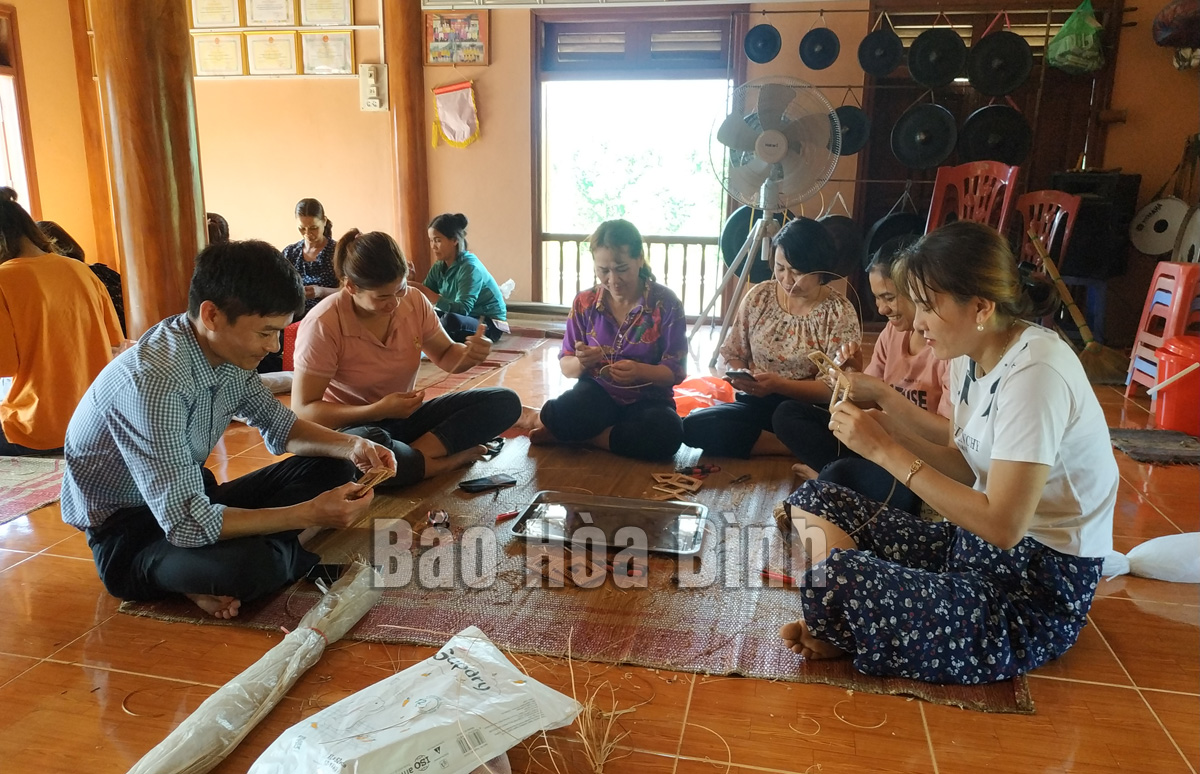
(HBO) - Providing vocational training and improving the quality of human resources is one of the policies carried out by provincial Party committees and administrations at all levels in Hoa Binh province, aiming to promote socio-economic development in ethnic minority-inhabited areas. Despite facing difficulties due to the unfavourable terrain and limited knowledge, many localities have carried out vocational training combined with job creation, bringing positive results.
A welding
class in Thong Nhat commune, Lac Thuy district.
Thong Nhat, a remote commune in Lac Thuy district, has more than 70% of its
population are ethnic minority people. It is home to five extremely disadvantaged
hamlets.
Implementing socio-economic development policies for ethnic minorities and
mountainous areas, the commune has coordinated with relevant agencies to open
many vocational training classes for rural workers. Priority has been given to
poor, disadvantaged and policy-beneficiary households. Three vocational
training classes were organised by the commune this year, attracting more than
130 labourers.
Bui Van Huan, Vice Chairman of the Thong Nhat Commune People's Committee, said
that welding and industrial sewing are selected for vocational training because
there are many enterprises that want to recruit workers with welding skills in
the locality. There are three garment factories that are in need of female
workers, thus the commune proposed the district Centre for Continuing Education
and Vocation Training to organise classes to create employment opportunities
for workers, ensuring that they will get jobs after completing their training.
Improving the quality of vocational training in association with job creation
and helping people secure a sustainable livelihood, is also the target of the
district in this regard.
Dang Thi Vy, Deputy Director of Lac Thuy district’s Centre for Continuing
Education and Vocational Training, said before opening classes, it conducted
surveys on the demand of enterprises and labourers. After collecting data, the
district coordinated with enterprises to develop plans and carry out
on-the-spot vocational training. Five classes have been organised by the centre
so far.
Da Bac district has allocated 1.4 billion VND (59,550 USD) for holding 17
training classes for ethnic minority people under the socio-economic
development project in ethnic minority-inhabited and mountainous areas for the
2021-2025 period.
Dinh Thi Nam, Head of the Division of Ethnic Minority Affairs of Da Bac
district, said that the district has many potential and advantages for tourism
development, especially community-based tourism. To improve the quality of
human resources for the development of the tourism industry, it has offered
training in such professions as tour guide, cooking, and brocade embroidery.
In line with the National Target Programme on Socio-economic Development in the
ethnic minority-inhabited and mountainous area for the 2021 – 2025 period, the
province aims to fulfill the target of about 63% of labourers of the working
age will receive proper vocational training that is suitable to their
aspirations and living conditions.
To this end, the provincial People's Committee has directed departments,
agencies and People's Committees of districts and cities to promptly develop
plans and carry out vocational training programmes for workers in the ethnic
minority-inhabited and mountainous areas.
Attention will be paid to dissemination and providing counseling for ethnic
minority people in selecting occupations that are suitable totheir
conditions and capacity.
Along with supporting costs for vocational training and changing occupations
for households and ethnic minorities, the province will continue to have
mechanisms to encourage businesses, cooperatives, and establishments to recruit
workers that have undergone training./.
Hoa Binh province is undergoing a dynamic transformation amid Vietnam’s national digital transition. Building on Poliburo’s Resolution No. 57-NQ/TW on breakthroughs in science, technology, innovation, and national digital transformation, the province has rolled out a wide range of practical action plans. A standout initiative is the "Digital Literacy for All” movement, an effort to ensure that no one is left behind in the digital era.
Hoa Binh province is undergoing a dynamic transformation in the wake of the national digital transformation movement. Building on Resolution No. 57-NQ/TW of the Politburo on breakthroughs in science, technology, innovation, and national digital transformation, the province has implemented a wide range of practical action plans. A standout initiative is the "Digital Literacy for All” movement ambitious effort to ensure that no one is left behind in the digital age.
With a spirit of unity and proactive problem-solving, the Party Committee, the government and the people of Dong Lai Commune (Tan Lac District) have made great strides in implementing the resolutions of the 24th Party Congress of the commune for the 2020 - 2025 term. Focusing on leadership and practical actions, the commune has brought the Party’s resolutions into daily life, creating strong impacts and pushing the local development forward.
Amid the nationwide push for digital transformation, young people in Hoa Binh Province are stepping up as dynamic pioneers, applying technology to enhance Youth Union operations and expand the reach of youth-led initiatives. Through creativity and adaptability, Youth Union organizations at all levels have introduced a series of practical solutions, contributing to modern governance and community development.
In recent years, An Nghia commune, located in Lac Son district, has stepped up administrative reform, focusing on improving the quality and efficiency of its single-window service unit for receiving and processing administrative procedures. These improvements have helped create favourable conditions for local residents and organisations to handle administrative procedures, contributing to the commune’s broader socio-economic development.
The Prime Minister-approved master plan to develop the multi-use value of forests ecosystems through 2030, with a vision to 2050, aims to improve the management and sustainable use of forest resources, create jobs, increase incomes, and improve the living standards of ethnic minorities, people in mountainous and remote areas, forest workers and those living near forests.



